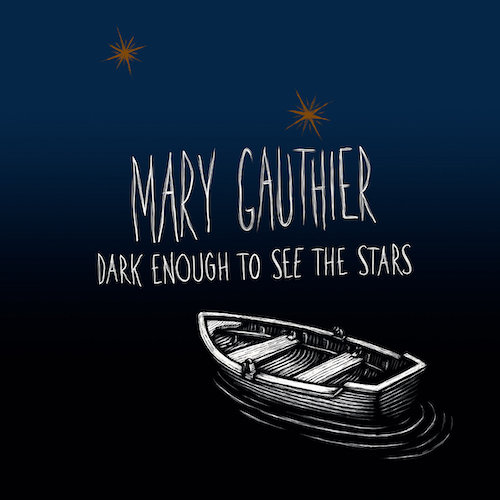
Mary Gauthier
Dark Enough To See The Stars
Thirty Tigers
2022
Dark Enough To See The Stars is Mary Gauthier’s first new material since 2018’s Rifles & Rosary Beads. Gauthier’s ninth studio album, its title a quote from Martin Luther King’s final speech, The Mountain Top, has more of a personal than a political core; many of the songs informed by the loss of people close to her during the pandemic, whether from Covid or other causes, among them fellow musicians John Prine, Nanci Griffith, and David Olney and her fellow Red Trail hiker and friend of 20 years Betsy who died from an allergic reaction to a tick bite while out walking.
The album was produced by Neilson Hubbard and features Jaimee Harris and Juan Solorzano on guitars, bassist Michael Rinne, Danny Mitchell on keyboards, violinist Michele Gazich, the inimitable Fats Kaplin on pedal steel and viola with Hubbard on his customary drums with Allison Moorer, Ben Glover and, especially, Harris on harmonies. Taking musical inspiration from The Band, it opens with the organ-backed Glover co-write Fall Apart World and its theme of finding positivity (“Sunrise at low tide, songbirds on a high wire/Full moon on the hillside, hanging low”) in the face of all the shit the world throws at you and the anchor of her relationship with Harris (“I was stranded, shipwrecked, sidelined, on the shore/You wrapped your arms around me now I look for love no more”) “in this broken-up, fall apart world”.
Just over five minutes, opening with Roy Bittan-like piano, Amsterdam, a co-write with Harris, was born of happenstance when, after a flight to Denmark was cancelled, they ended up spending three days in the Netherlands capital, the city where she got her first record deal. The song rejoices in revisiting those old streets with her new love after a “heartbreak year” as, in her distinctive twang, she sings about “Bicycle bells on Rembrandt Street, Spanish shoes on a stranger’s feet/Newsboy caps, old Dutchmen, an alley cat with a Cheshire grin/Sailor’s bars, old cafe’s, cobblestone carriageways” and “feeling all right”.
Gauthier’s years as an alcoholic and addict are well-documented and, set to a slow walking rhythm with piano jangles, Thank God For You, a collaboration with Caleb Elliot and Peter Case is a simple thank you after finding contentment with Harris after being “just another junkie jonesing on a Greyhound bus/With a twenty-year ticket to a tortured mind/Sirens, sorrow, cigarette butts/My Jesus in pieces, broken as the highway lines”.
Again written with Harris, the steady strummed How Could You Be Gone with its keening violin returns to the subject of death and, here, funerals (“I don’t know what to wear/I don’t know who will be there/I wanna call you, I wanna cry/I don’t wanna say goodbye”) perfectly captures that sense of loss among the mourners, and the difficulty in accepting they’re not coming back, ending with the heartwrenching line “I walk alone back to my car/I go before the goodbyes start/I have always been this way/You were the only one who could make me stay”. The theme continues with the piano and brushed drums of Where Are You Now, written with Glover, who sings harmonies, about Betsy and the shock of her sudden death as Gauthier wanders through the landscape they used to share
Featuring fingerpicked guitar and pedal steel, co-penned with Mary Chapin Carpenter, the beautifully poetic title track (“Curse the clock time is a thief, every life it measures brief/Every child is born to die, but the soul is born to fly/Under heaven’s canopy, tiny diamonds you and me”) is another remembrance of lost friends and the pain of their passing but also a celebration of what they brought and left behind “As I hold onto your love, like those lights from up above”.
Pedal steel and starlight imagery continue with the introspective The Meadow, another Glover co-write and a musical nod to Prine, that looks back at her restless years and avoidance of commitment (“Don’t know why I’m always leaving I don’t know why know why I left you”) before being “ready to come clean…so tired of running from things I cannot leave”, lying together on the grass and looking up at the stars.
Taking a thematic swerve, written with Darden Smith and long-haul truck driver Paul Marhoefer and with organ swirls and Gauthier on harmonica, Truckers and Troubadours is a honky tonk slow swayer that draws parallels between the two breeds spending time away from home and always just passing through (“Interstate headlights and stars in our eyes/Packing our bags as we must/Sometimes it’s heaven, sometimes it’s hell/Slaves to the old wanderlust”). Life on the road and the separation it entails is also the subject of About Time, the only solo writing credit, delivered in her semi-spoken breathy drawl and again featuring harmonica about “the many towns between us/So many nights, so many stairs to climb” and featuring the wonderful image of “your candlestick fingers on my skin”.
It ends, fittingly then, with the final Glover collaboration, the elegiac guitar, viola and piano arranged Till I See You Again, another of his wonderful, emotional benedictions, a prayer for those departed, the sentiment of which conjures Dylan’s Forever Young and John Martyn’s May You Never in its prayer for an end to suffering and troubles as she sings “May eternity hold you in the hollow of her hand/May a soft wind enfold you as you travel distant lands…May there be no more struggle, no more pain; may you sleep inside the stillness of the light, till I see you again.”
Dark Enough To See The Stars is another magnificent reminder that few shine as brightly as Gauthier.
Stream / Purchase: https://orcd.co/darkenoughtoseethestars

